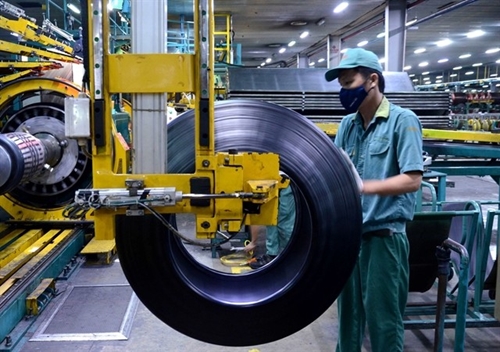This is one of two VEPR scenarios regarding Vietnam's economic growth in the fourth quarter of this year, released in Hanoi early this week. While both refer to advantages, difficulties and challenges, the other, less optimistic scenario predicts a growth rate of below 7% in the fourth quarter and around 6.84% for the whole year.
    |
 |
|
Support policies are necessary to achieve the GDP target of 7% for the whole year. |
VEPR Deputy Director Dr Nguyen Quoc Viet said that by the end of the third quarter, Vietnam's economy had recovered significantly.
GDP in the first nine months of this year grew impressively to reach 6.82%, 1.5 times higher than the 4.4% recorded during the same period last year, with the industrial and service sectors playing leading roles.
In terms of aggregate demand, the upturn in trade and FDI has become the main driving force for the economy. Notably, the value of goods trade far exceeded expectations, with a total turnover of 578.5 billion USD, a sharp increase of 16.3% over the same period, and a trade surplus of 20.8 billion USD. This can be considered an outstanding achievement during the 2020-2024 period, Viet said.
Another positive development was that State budget revenue exceeded the plan, while public spending decreased compared to the same period in 2023.
This opens up opportunities to continue implementing support policies, such as tax exemptions and reductions, especially in the context of many industries being affected by Typhoon Yagi.
In addition, the State Bank continued to implement successful and flexible monetary policies.
However, Phan Duc Hieu, a standing member of the National Assembly's Economic Committee, said that the challenges in the last months of 2024 remain considerable.
The damage caused by Typhoon Yagi has not been completely overcome, severely affecting the production and business activities of both enterprises and people.
The rapid implementation of post-typhoon support policies is necessary to promote economic growth and achieve the GDP target of 7% for the whole year, especially the Government's Resolution 143 on the key tasks and solutions for promptly settling the aftermaths of Typhoon Yagi.
According to VEPR experts, significant risks and challenges still lie ahead. Consumer spending has not yet returned to pre-pandemic levels, while inflationary pressures in the first half of 2024 have somewhat restrained investment growth.
In addition, the purchasing managers' index (PMI) fell below 50 points in September. Meanwhile, the number of businesses leaving the market continues to exceeds the number of businesses entering.
Besides that, cost-push inflation makes export competitiveness and the ability to participate more deeply in the global value chain face many challenges.
Meanwhile, although there has been some progress in terms of reform of the business environment and institutions, many risks still exist for investment and business.
Vietnam's economy is still heavily dependent on exports, making the growth vulnerable to fluctuations in the global economy, Viet said.
Besides, the budget revenue structure still depends on revenue from land, imports and exports, which are unsustainable sources.
Economist Pham Chi Lan said that the achievements in the third quarter of this year give Vietnam confidence in recovery and development in the coming years. However, growth in the third quarter still relies on exports.
The poor development of domestic supporting industries and micro, small and medium enterprises has hindered the country's efforts to participate in the global value chain.
Standard Chartered has also upgraded its forecast for Vietnam’s 2024 GDP growth to 6.8% from the previous 6.0%, reflecting the stronger-than-expected expansion in the third quarter of this year.
In a report released last week, the bank’s economists said the country’s economic growth momentum has been relatively strong, with improvements across multiple sectors, including imports and exports, retail sales, real estate, tourism, construction, and manufacturing.
Trade recovery, along with increased business activities and foreign investment, will be the main boosters for 2025 and beyond, they added.
Tim Leelahaphan, Standard Chartered Bank economist for Thailand and Vietnam, said: “While we remain cautious on Vietnam’s economy in the near term, we also acknowledge the economy’s ability to perform better than market expectations.
“The government’s push for stronger economic growth may help maintain low interest rates in the near future, and Fed moves will also be key to the State Bank of Vietnam’s monetary policy decisions. We now expect a 50-basis point rate hike next year, rather than in Q4/2024 as previously anticipated.”
Standard Chartered forecasts that Fed rate cuts, which should lead to a softer US dollar bias over the next few quarters, will result in a USD/VND exchange rate at 24,500 by the end of 2024 and 24,300 by mid-2025.
Source: VNA